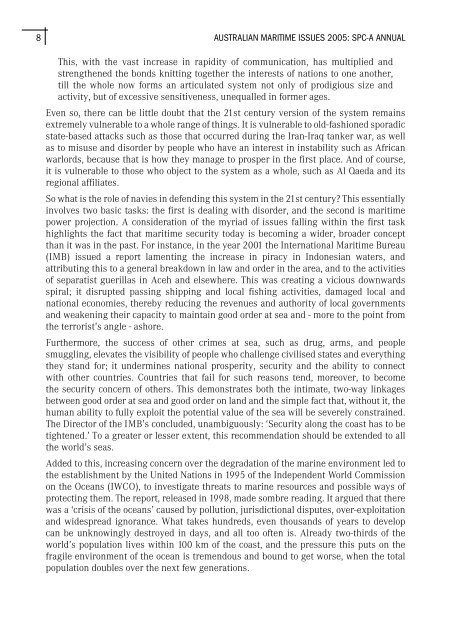Australian Maritime Issues 2005 - Royal Australian Navy
Australian Maritime Issues 2005 - Royal Australian Navy
Australian Maritime Issues 2005 - Royal Australian Navy
You also want an ePaper? Increase the reach of your titles
YUMPU automatically turns print PDFs into web optimized ePapers that Google loves.
AUSTRALIAN MARITIME ISSUES <strong>2005</strong>: SPC-A ANNUAL<br />
This, with the vast increase in rapidity of communication, has multiplied and<br />
strengthened the bonds knitting together the interests of nations to one another,<br />
till the whole now forms an articulated system not only of prodigious size and<br />
activity, but of excessive sensitiveness, unequalled in former ages.<br />
Even so, there can be little doubt that the 21st century version of the system remains<br />
extremely vulnerable to a whole range of things. It is vulnerable to old-fashioned sporadic<br />
state-based attacks such as those that occurred during the Iran-Iraq tanker war, as well<br />
as to misuse and disorder by people who have an interest in instability such as African<br />
warlords, because that is how they manage to prosper in the first place. And of course,<br />
it is vulnerable to those who object to the system as a whole, such as Al Qaeda and its<br />
regional affiliates.<br />
So what is the role of navies in defending this system in the 21st century? This essentially<br />
involves two basic tasks: the first is dealing with disorder, and the second is maritime<br />
power projection. A consideration of the myriad of issues falling within the first task<br />
highlights the fact that maritime security today is becoming a wider, broader concept<br />
than it was in the past. For instance, in the year 2001 the International <strong>Maritime</strong> Bureau<br />
(IMB) issued a report lamenting the increase in piracy in Indonesian waters, and<br />
attributing this to a general breakdown in law and order in the area, and to the activities<br />
of separatist guerillas in Aceh and elsewhere. This was creating a vicious downwards<br />
spiral; it disrupted passing shipping and local fishing activities, damaged local and<br />
national economies, thereby reducing the revenues and authority of local governments<br />
and weakening their capacity to maintain good order at sea and - more to the point from<br />
the terrorist’s angle - ashore.<br />
Furthermore, the success of other crimes at sea, such as drug, arms, and people<br />
smuggling, elevates the visibility of people who challenge civilised states and everything<br />
they stand for; it undermines national prosperity, security and the ability to connect<br />
with other countries. Countries that fail for such reasons tend, moreover, to become<br />
the security concern of others. This demonstrates both the intimate, two-way linkages<br />
between good order at sea and good order on land and the simple fact that, without it, the<br />
human ability to fully exploit the potential value of the sea will be severely constrained.<br />
The Director of the IMB’s concluded, unambiguously: ‘Security along the coast has to be<br />
tightened.’ To a greater or lesser extent, this recommendation should be extended to all<br />
the world’s seas.<br />
Added to this, increasing concern over the degradation of the marine environment led to<br />
the establishment by the United Nations in 1995 of the Independent World Commission<br />
on the Oceans (IWCO), to investigate threats to marine resources and possible ways of<br />
protecting them. The report, released in 1998, made sombre reading. It argued that there<br />
was a ‘crisis of the oceans’ caused by pollution, jurisdictional disputes, over-exploitation<br />
and widespread ignorance. What takes hundreds, even thousands of years to develop<br />
can be unknowingly destroyed in days, and all too often is. Already two-thirds of the<br />
world’s population lives within 100 km of the coast, and the pressure this puts on the<br />
fragile environment of the ocean is tremendous and bound to get worse, when the total<br />
population doubles over the next few generations.

















